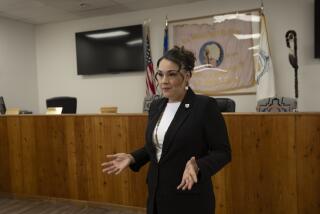Nevada Net Gaming May Be in Cards
- Share via
LAS VEGAS — A bill paving the way for Nevada casinos to enter the volatile Internet gambling business passed through the state Legislature on Monday and was headed to the desk of Republican Gov. Kenny Guinn for his expected signature.
But casinos face several hurdles before their patrons can place bets on computers and spin wheels or throw dice by the click of a mouse. And the new law specifically forbids Internet sports or race betting.
The legislation authorizes the Nevada Gaming Commission to allow Internet gambling--but only after it establishes controls and guidelines to protect against fraud and to screen out people under 21 or those who live in jurisdictions, such as California, where it is illegal.
Technology to do that is under development.
Furthermore, Nevada casinos cannot offer virtual gambling until it is clearly allowed by federal laws, which now are considered ambiguous. Casino industry lawyers believe those laws will be clarified by federal courts before the technology is in place to conduct Internet gambling.
No other state has specifically approved online wagering.
“The world has always looked to Nevada to take the lead on all the issues associated with gaming,” Brian Sandoval, chairman of the gaming commission, said after Monday’s 17-4 passage of the bill in the state Senate.
The Assembly approved the measure Sunday.
$5-Billion Revenue in 2 Years Expected
Nevada’s casinos previously had argued against virtual gambling, but as the business has spread to more than 1,400 Web sites--most of them operated by poorly or unregulated offshore companies--Nevada’s casinos decided they wanted a piece of the action.
Some casinos already have launched “play-for-fun” Internet sites, considered precursors to the real thing.
Because of Nevada’s reputation for controlling the casino industry, its Internet gambling sites are expected to win the broad support of wary gamblers.
Internet gambling is projected by Wall Street analysts to generate about $5 billion within two years.
Sandoval would not predict how long before the state gives its final blessing to Internet gambling, but said that “we are going to move forward cautiously.”
He rejected criticism that the debut of Nevada casinos on the Internet will feed the insidious sprawl of gambling across the globe.
“I’ve never viewed this as a predatory method of providing gaming,” he said. “There’s a segment of the population that prefers to gamble online, and currently they’re doing it in an unregulated, uncontrolled environment. Anyone who wants to do it can do it now.
“But this is an opportunity for Nevada to create a well-regulated, controlled environment.”
Tony Cabot, an attorney specializing in Internet gambling, said online wagering is “a major portion of the future of the industry. It’s great to see the public policymakers come to the realization that, like every other industry in America, the gaming industry is getting ready to be part of the 21st century.”
The Internet gambling bill was one of the most closely watched in the Legislature, which meets for only 120 days every two years.
In the closing hours of the session Monday, legislators also enacted a law, approved by voters in November, allowing the use of marijuana for medical purposes, even though the federal courts have outlawed such use.
Legislators also reduced possession of up to an ounce of marijuana from a felony to a misdemeanor.
Another bill--to place a two-year moratorium on executions while the state studies whether capital punishment prosecutions reflect racial or economic biases--quietly died in an unenthused Assembly committee after having won slim bipartisan approval in the Senate.
Lawmakers Refuse to Raise Gambling Tax
Key Republican leaders in the Assembly, including Speaker Richard Perkins, a deputy police chief in Henderson, said a moratorium would insult the relatives of murder victims and send an inappropriate message to criminals that Nevada was going soft on hardened criminals.
The casino industry--the state’s biggest collective power broker--fared well among Carson City’s politicians.
Even though the state is financially pinched, lawmakers again rebuffed persistent efforts to raise the current 6.25% gambling tax assessed on casinos.
Lawmakers also rejected a state lottery, which would have competed with casinos, and they voted to allow casinos to allow the wealthiest of their high-rollers, known in the business as “whales,” to gamble in private casino salons removed from public view.
More to Read
Sign up for Essential California
The most important California stories and recommendations in your inbox every morning.
You may occasionally receive promotional content from the Los Angeles Times.













